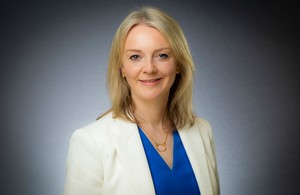We must reach REAP’s goal of making 1 billion people safer from disaster
Excellencies, friends,
On behalf of the governments of Saint Lucia and the UK and the Risk-informed Early Action Partnership – welcome to you all.
Thank you for joining today’s important discussions to determine how to scale up early action on disasters.
We must reach REAP’s goal of making 1 billion people safer from disaster by 2025.
Between 1970 and 2019, 79% of disasters involved weather, climate and water-related hazards.
70% of resultant deaths occurred in the Least Developed Countries.
Sadly, these events will only increase.
But increasing also is our ability to forecast and forewarn: over half of humanitarian needs stem from ‘predictable’ events.
But still only 1% of humanitarian finance is prearranged.
This is not good enough.
This is where REAP partners come in.
We are already seeing the benefits of early action.
But we must see early action mainstreamed, embedded into policy and plans.
As we heard at the Climate and Development Ministerial at the end of March, early action is a priority for developing countries.
So we must work together to make risk-informed early action the default position.
In 2019 the UK committed £175m to REAP targets. Since then, we have continued to provide expert technical support to REAP.
And the UK funds the REAP Secretariat, who brought us all here today, finding common solutions to global problems.
The UK is a contributor to the IFRC’s Disaster Relief Emergency Fund (DREF), including its Forecast-based Action window.
The UK is working with the British Red Cross to increase access to Forecast-based Finance, supporting early action in Southern Africa and the Sahel.
As one of the largest donors to UN OCHA’s Central Emergency Response Fund (CERF), the UK supports its allocation of up to $140 million to Anticipatory Action, tackling food insecurity in Ethiopia and Somalia, and flooding in Bangladesh.
The UK has invested in expanding disaster risk insurance, so that governments can access cover at reduced prices.
The African Risk Capacity (ARC) enables governments to insure against drought, and the ARC has provided $500m in drought risk coverage, and $64 million for early responses.
The UK is the largest contributor to the World Bank’s International Development Association (IDA), which disbursed $20m to support St Vincent and the Grenadines, to provide money fast after the recent volcanic eruption.
So today, the UK would like to demonstrate further commitments to REAP:
To advance progress on Target 1, the UK will fund work with a priority group of vulnerable countries, to review and integrate climate and disaster laws, policies and procedures.
Partners will develop robust and appropriate policy frameworks, and effective disaster risk management plans.
To advance progress on Target 2, we will provide expert support to strengthen and expand shock-responsive social protection.
Today we are committing an additional £12m to the Start Network’s Start Fund, so that frontline actors can respond swiftly and ahead of underfunded humanitarian crises.
This money will enable Start Network to develop an innovative series of ‘hubs’ to improve forecasting and locally-led action.
A further £8 million will support the Centre for Disaster Protection to help climate-vulnerable countries to prepare for disasters.
Our progress relies on strong evidence:
The UK-funded Adaptation Research Alliance (ARA) will work with REAP to address research needs, ensuring that strong evidence underpins the fulfilment of targets.
REAP partners are invited to work with us, to ensure research benefits the end user.
Because as well as scaling up, REAP calls us to change how we manage risk.
The UK’s FCDO is integrating a climate and environment risk assessment into all of its new programming.
The UK’s G7 presidency has focused on anticipating shocks and acting early.
The UK secured G7 commitment to do more, by pre-agreeing emergency funding so that countries can act early.
The UK led the development of the G7 Famine Prevention and Humanitarian Crises Compact to increase anticipatory action and support to the CERF.
At the G7 in June, we hope to lead the way with more ambitious commitments to REAP targets.
At COP26 in November, we will demonstrate further investment in climate services and disaster risk reduction.
So now, it’s over to all of you:
Those who have come forward to act on avoidable losses, and those who feel their impacts first-hand.
We look forward to hearing what you can offer this ambitious partnership,
Where you can make investments that make a difference,
And, indeed, how your experiences have lead to change.
So, thank you to all of you for your collaboration, your commitment and your ambition for this lifesaving agenda.
I will now hand to my colleague Diann Black-Layne, Ambassador for Climate Change and Director of the Department of the Environment of Antigua and Barbuda. Welcome Diana, it will be wonderful to hear your reflections.

